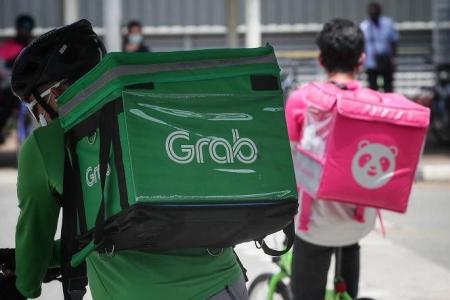Work Injury Compensation Act may be applied to 'employee-like' gig workers: Koh Poh Koon
An advisory committee set up last year to better protect platform workers is looking at whether the Work Injury Compensation Act (WICA) can be applied to them to provide greater financial protection when they are injured.
The authorities are also working with food and goods delivery companies here to review their work processes after traffic accidents claimed the lives of five delivery platform workers in the past year and a half.
Platform workers are workers who rely on online platforms for income, mainly cabbies, private-hire car drivers and deliverymen. They are considered to be self-employed and are not covered under WICA or the Employment Act.
But Senior Minister of State for Manpower Koh Poh Koon said on Tuesday (July 5) that these workers are in fact more like employees given the management controls exerted by the platforms and their algorithms.
Hence, the advisory committee, after consulting widely, is taking the principle that a delivery gig worker is not dissimilar from a worker who does delivery work as an employee if they provide the same services to people.
"By providing some form of equal principle in terms of protection using the Workplace Injury Compensation Act, we hope to actually cover some of the vulnerabilities of this segment of workers," Dr Koh said.
"In principle, there should be no differentiation whether the person's life is worth more or less just because he is being engaged in a different form of employment."
Dr Koh was responding in Parliament to Dr Tan Wu Meng (Jurong GRC), who had asked why workers in the gig economy cannot be covered under WICA if the law covers employees who have flexible work arrangements.
Calling the lack of work injury compensation for gig workers a "policy lacuna", Dr Tan said there are broader implications for workplace safety if this gap is not closed.
"What happens if, tomorrow, a marine, manufacturing or construction company decides to gazette their Singaporean workers as self-employed or independent contractors? They would need protections too," he said.
"No company should ever be allowed to send the message that when a worker dies, it is, 'you die, your problem'. Because when a worker dies on the job, it is everyone's problem."
In response, Dr Koh said the advisory committee, comprising representatives from the Government, labour movement, industry and academia, has been deliberating these issues. It is expected to give its recommendations later this year.
On Dr Tan's point about reclassifying workers, Dr Koh said that in adjudicating such disputes, it is important to look at the nature of engagement between the company and the worker - for example, whether the company has to provide a workplace and equipment, and whether the worker is expected to meet certain key performance indicators.
"In that case, that relationship is more akin to an employer-employee relationship, and the company will then be expected to provide employee benefits to this worker under the Employment Act," Dr Koh said.
"It does not matter whether the person is a full-timer or a part-timer, or whether in the contract itself, the company claims this person is self-employed."
Dr Koh added that workers should look closely at the terms of their contractual agreements before they sign them, and approach the Tripartite Alliance for Dispute Management for help if they are unclear.
Dr Koh had raised the idea of applying WICA to gig workers during the debate on his ministry's budget earlier this year, noting that the insurance coverage provided to platform workers is not consistent across companies.
Ride-hailing and food delivery giant Grab currently offers free personal accident insurance to its delivery workers when they are using the Grab platform, with a sum insured of US$20,000 (S$28,000) in the case of accidental death or permanent disability. For foodpanda, the sum insured for its active riders is $30,000 for death or permanent disability, while Deliveroo riders get US$45,000(S$63,000).
Under WICA, the minimum compensation for the accidental death of an employee is $76,000 and the maximum is $225,000, depending on age and monthly earnings.
The amount payable for permanent incapacity, which includes fractures, sprains and cuts, is between $97,000 and $289,000, but the compensation sum is then adjusted according to the degree of disability.
In the light of the recent fatal accidents involving delivery workers, Dr Koh said the Workplace Safety and Health Council is working with food and goods delivery companies to enhance the safety of workers on the road and prevent accidents.
More details will be shared when ready.
In a separate written reply on Monday (July 4), Manpower Minister Tan See Leng said no delivery employees have died at work in the past five years.
Last year, there were 17 work injuries among delivery employees that resulted in permanent incapacity, compared with 16 in 2020, 17 in 2019 and 12 in 2018.
The median work injury compensation amount awarded to these workers in those years was $8,951, $15,085, $9,907 and $5,298 respectively.
Get The New Paper on your phone with the free TNP app. Download from the Apple App Store or Google Play Store now


